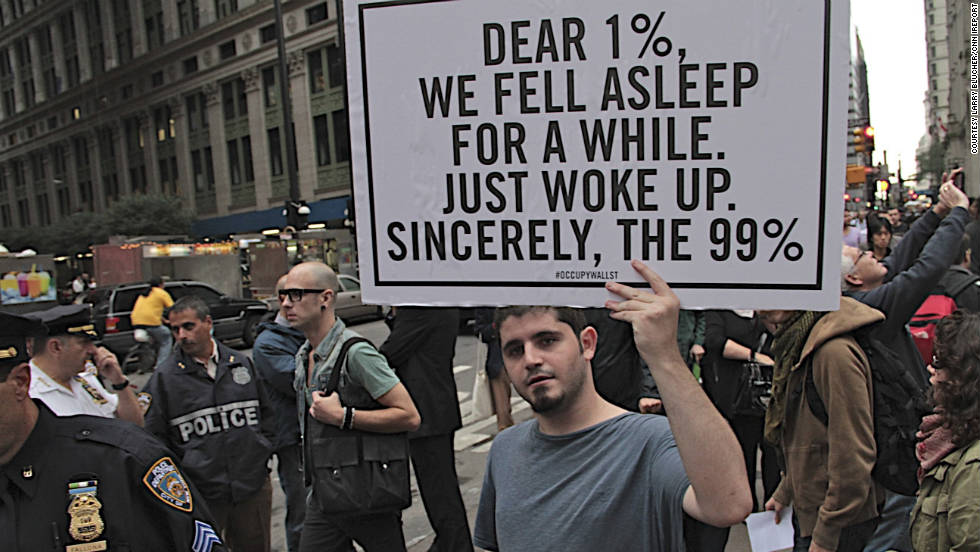 |
| So, why did you go back to sleep? |
Who can fix it isn't the right question. And, no, in my intro I don't mean to suggest we've discovered all we're ever really going to discover. There is so much undiscovered country.
But I do mean to suggest that we know enough about how to live, about how to get along, about how to navigate toward a world that celebrates the common good and away from one that encourages narcissistic, greedy individualism.
The who should do it is answered. Us. It's the how that needs to be rediscovered, reembraced. I was reminded of that in a Jacob Sugarman interview of the British documentarian Adam Curtis in Salon.
Curtis, who says his favorite theme is "power and how it works in society," hit several strong notes in this interview. First, was the notion of "hypernormalisation."
AC: The term was created by a guy called Alexei Yurchak, who wrote a book about the last days of the Soviet Union in the 1980s. What he described was a world where everyone knew that the system in place wasn’t working and that the politicians didn’t believe it any longer. Yet at the same time, because they didn’t have any alternative, everyone just accepted it as normal even though they knew it was abnormal. So he gave it this term hypernormalisation. I’m not trying to say that the West is in any way like the Soviet Union at all. It’s very different. What I was trying to argue, or imply in this film gently, was that we may be in a very similar situation where we know that the system has become somewhat corrupted. But more than that, we know that those in charge don’t really believe in the system any longer, have no vision of the future. And what’s more, they know that we know that.This is a great insight. Liberals, in a sense, can be defined as those who have come to understand the corruption of capitalism in a sea of under-regulated, dysfunctional markets, which, by the way, is the system conservatives have come to appreciate as the way it's supposed to be, even if it's essentially the way the greedy elite continue unabated to line their pockets. Conservative politicians thrive in this system. The donor class sustains the political class, which in turn feeds the donor class. Crafty closed loop.
A few years back, Occupy Wall St. came along with, according Curtis, most but not all of what it takes to be a positive force for real change. Part of the problem with the Occupy movement was the milieu in which it arose, but that was only part of the problem.
JS: I can’t help but notice that the kind politics you’re advocating sound a lot like those Obama ran on in 2008. Do you think he failed to live up to the promises of that campaign? Is Donald Trump a part of his legacy now?
AC: I don’t know, but I don’t think so. I think Obama was a very decent guy. Since the early 1990s, real power has shifted away from politicians to all sorts of institutions that we almost don’t have the perception apparatus to see or understand. Frankly, a journalist doesn’t. I think Obama found himself facing a lot of that. But it’s us as well. At the same time that Obama came to power, we, the liberals, the Democrats, the progressives retreated to digital playgrounds owned by five or six very giant corporations. I think they left Obama quite isolated, actually. So far from snarling and spitting at him, which much of the left has done, they should actually turn around and look at themselves and wonder, possibly did we go down the wrong avenue believing all that internet utopianism? I just think that it’s time for a little humility among some of the progressives in their attitude to Obama.
As I point out in Hypernormalisation, the Occupy movement had a fantastic slogan and the goodwill of lots of people who would normally never support a rebellious movement like that. Yet when they actually got together, they found they had no ideas. I think it’s pretty rich that they then turned around and tried to blame Obama for not having a picture of the future when, quite frankly, they didn’t. If you want to change the world, A, you’ve got to work at it very hard, and B, you’ve got to challenge power, and that’s quite frightening and quite difficult, and you have to have a very strong idea of what you want."They found out they had no ideas." Wow. Nail, hit on head. It reminds me of two of the key threads of the countercultural movement into which I emerged out of high school. One was the anti-war movement, and the other was the civil rights movement that immediately preceded it. Both were totally immersed in and powered by action, positive, take-to-the-streets action, which of course could describe the Occupy movement. But what we had back then were concrete ideas: War in and of itself was bad, and if it wasn't outright bad, then the concept of a bad war was. With civil rights, again, we had the concrete: Discrimination was wrong. The first focus was race, but that moved quickly to sex, religion, gender, creed. These are powerful, concrete ideas upon which to base action.
Occupy had a problem: Carrying signs decrying the 1% wasn't enough. Basically what Occupy was saying was, "Give us back a big chunk of our money, or we're going to stay in this park and repeat after each other."
Liberals do have ideas, concrete ideas, but putting these into action is hard, not undoable, just hard. And, as Occupy proved, having no leaders is a drawback. Bernie Sanders is a leader, and he essentially has the right ideas -- so does Thomas Picketty in his Capital in the Twenty-Fir

No comments:
Post a Comment